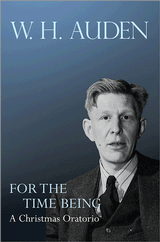Review by Jonathan Kanary
Advent this year found me meditating on our human incapacity to salvage (in theological language, “save”) ourselves — or even to fathom what any true salvation must look like. Even in the ordinary give-and-take of human relationships and endeavors, our efforts are never quite adequate. There is always a whiff of failure: that faint but ineradicable taste of mortality.
| For the Time Being A Christmas Oratorio By W.H. Auden. Edited and with an introduction by Alan Jacobs. Princeton. Pp. 136. $19.95 |
And so it must be in a fallen world, if we are to have any hope of salvation at all. It is only when we come to the end of ourselves that the door opens. “The garden is the only place there is, but you will not find it / Until you have looked for it everywhere and found nowhere that is not a desert.” Failure demands our attention to a crucial truth: “Nothing can save us that is possible.” These lines are from the beginning of W.H. Auden’s Christmas Oratorio, For the Time Being, his attempt to capture the redeeming catastrophe of the Incarnation. The opening passage, appropriately enough, is “Advent” — the season of our yearning, and the ache of our own inadequacy.
The rest of the poem follows a biblical narrative, although the method is not so much that of the modern scholar as of the medieval mystery play. The familiar figures of the Christmas story are here, but surrounded by modern accoutrements and speaking a 20th-century poetical tongue. Auden does not dismiss history, but he wants to avoid the trap of “historicity” as one more technique to distance ourselves from the immediate and personal threat and promise of Christmas. The Savior’s birth is a specific and singular historical event, but it is not just something that happened once, safely far away, off there somewhere. This is something that has happened, and continues to happen, to us. And a response is demanded.
 He captures this crisis in “The Temptation of St. Joseph,” drawing our attention to an often-neglected figure in the Nativity story. (Alan Jacobs’s excellent introduction explains how this section of the poem both expresses and transcends Auden’s own relational struggle.) In St. Joseph’s story we see the devotion of human love put to the test as Divine Love approaches. What it demands is a heartbreaking surrender: humility to accept the salvation God sends, rather than the one we had dreamed or expected. “To choose what is difficult all one’s days / As it if were easy, that is faith. / Joseph, praise.”
He captures this crisis in “The Temptation of St. Joseph,” drawing our attention to an often-neglected figure in the Nativity story. (Alan Jacobs’s excellent introduction explains how this section of the poem both expresses and transcends Auden’s own relational struggle.) In St. Joseph’s story we see the devotion of human love put to the test as Divine Love approaches. What it demands is a heartbreaking surrender: humility to accept the salvation God sends, rather than the one we had dreamed or expected. “To choose what is difficult all one’s days / As it if were easy, that is faith. / Joseph, praise.”
As Auden makes clear, all human efforts to attain salvation are potential avenues of escape from the stark demands of Incarnate Love. In his poem, the magi give voice to philosophy, culture, and high abstraction: the pleasures and sorrows of the mind. The shepherds represent the ordinary everyday life of the “working classes”: physical labor and pleasure and pain. At the manger, shepherds and magi in turn describe their efforts — and ultimate failure — to escape the Love that redeems and draws both near. St. Simeon and King Herod each wrestle at length with this same confrontation, and their own response to the event that overturns and renews everything. (King Herod as a modern politician offers an intriguing angle on the events of Matthew 2.)
Nor does Auden allow us to forget that we, too, must respond to Jesus’ arrival. Any retelling of the story, including the poem, stands as a challenge and rebuke to us. The Narrator’s closing speech is painfully honest: “Once again / As in previous years we have seen the actual Vision and failed / To do more than entertain it as an agreeable / Possibility.” And yet we cannot escape. Our human efforts are exposed in all their paltry inadequacy. Salvation has arrived. “We can repress the joy, but the guilt remains conscious; / Remembering the stable where for once in our lives / Everything became a You and nothing was an It.”
While the quality is occasionally inconsistent, there are some remarkably poignant and powerful passages. At his best Auden was a first-rate poet, and this work deserves its place alongside his better-known short works. But this is more than simply a noteworthy entry in the annals of 20th-century literature. As with the work of T.S. Eliot or Charles Williams (both of whose influence may be seen in Auden’s poem), this “Christmas Oratorio” is a source for meditation, and for prayer — using the forms of poetry to draw the heart to devotional response. Not just during Advent and Christmas, but “for the time being,” it is for all of us who need to be confronted once again by the devastating and jubilating arrival of salvation in the birth of Christ Jesus our Lord.
The Rev. Jonathan Kanary is curate at St. Columba Church in Fresno, California.









